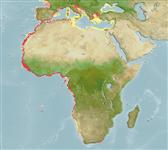Teleostei (teleosts) >
Scombriformes (Mackerels) >
Stromateidae (Butterfishes)
Etymology: Stromateus: Greek, stromatos = a fish flattened body with a lot of colours (Stromateus sp.) (Ref. 45335).
More on author: Linnaeus.
Environment: milieu / climate zone / depth range / distribution range
Ecology
Marine; benthopelagic; depth range 10 - 70 m (Ref. 2683). Subtropical; 48°N - 34°S, 18°W - 36°E
Eastern Atlantic: Bay of Biscay where rare (Ref. 6561) and the Mediterranean southward to the Cape of Good Hope, South Africa.
Size / Weight / Age
Maturity: Lm ? range ? - ? cm
Max length : 50.0 cm SL male/unsexed; (Ref. 6561); common length : 40.0 cm TL male/unsexed; (Ref. 26999)
Dorsal soft rays (total): 42 - 50; Anal soft rays: 33 - 38. Blue to brownish in color and darker spots dorsally, silver to whitish ventrally; juveniles with vertical bars on body and small black pelvic fins (Ref. 4410).
Found over continental shelves (Ref. 6561). Young are often found associated with pelagic medusae (Ref. 6561). Form large shoals (Ref. 27121). Feeds on small fishes and zooplankton, also medusae (Ref. 6561).
Life cycle and mating behavior
Maturity | Reproduction | Spawning | Eggs | Fecundity | Larvae
Haedrich, R.L., 1986. Stromateidae. p. 1192-1193. In P.J.P. Whitehead, M.-L. Bauchot, J.-C. Hureau, J. Nielsen and E. Tortonese (eds.) Fishes of the North-eastern Atlantic and the Mediterranean. UNESCO, Paris. Vol 3. (Ref. 6561)
IUCN Red List Status (Ref. 130435: Version 2024-2)
Threat to humans
Harmless
Human uses
Fisheries: minor commercial
Tools
Special reports
Download XML
Internet sources
Estimates based on models
Preferred temperature (Ref.
123201): 14.5 - 27.4, mean 19 °C (based on 242 cells).
Phylogenetic diversity index (Ref.
82804): PD
50 = 0.6250 [Uniqueness, from 0.5 = low to 2.0 = high].
Bayesian length-weight: a=0.01585 (0.00707 - 0.03555), b=3.01 (2.82 - 3.20), in cm total length, based on LWR estimates for this (Sub)family-body shape (Ref.
93245).
Trophic level (Ref.
69278): 4.0 ±0.50 se; based on food items.
Resilience (Ref.
120179): Medium, minimum population doubling time 1.4 - 4.4 years (Assuming tm=2-3).
Fishing Vulnerability (Ref.
59153): Moderate vulnerability (44 of 100).
Climate Vulnerability (Ref.
125649): Low to moderate vulnerability (33 of 100).
Nutrients (Ref.
124155): Calcium = 52.1 [26.1, 115.4] mg/100g; Iron = 0.864 [0.418, 1.689] mg/100g; Protein = 15.6 [13.6, 18.2] %; Omega3 = 0.276 [0.153, 0.481] g/100g; Selenium = 31.5 [14.0, 69.4] μg/100g; VitaminA = 14.4 [4.0, 52.8] μg/100g; Zinc = 0.547 [0.350, 0.842] mg/100g (wet weight);
